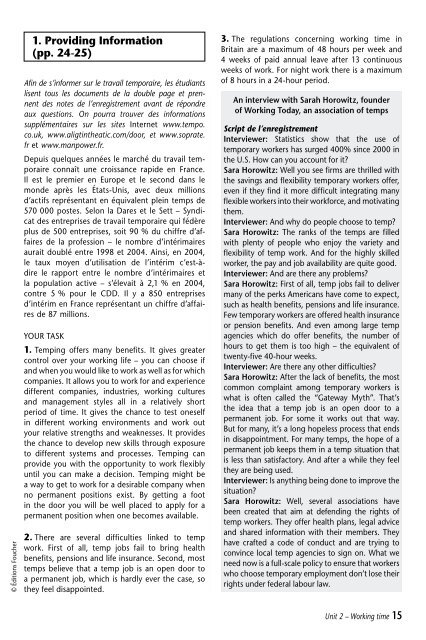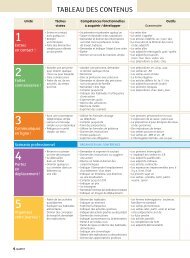GUIDE PÉDAGOGIQUE - Hachette
GUIDE PÉDAGOGIQUE - Hachette
GUIDE PÉDAGOGIQUE - Hachette
Create successful ePaper yourself
Turn your PDF publications into a flip-book with our unique Google optimized e-Paper software.
© Éditions Foucher<br />
1. providing information<br />
(pp. 24-25)<br />
Afin de s’informer sur le travail temporaire, les étudiants<br />
lisent tous les documents de la double page et prennent<br />
des notes de l’enregistrement avant de répondre<br />
aux questions. On pourra trouver des informations<br />
supplémentaires sur les sites Internet www.tempo.<br />
co.uk, www.aligtintheatic.com/door, et www.soprate.<br />
fr et www.manpower.fr.<br />
Depuis quelques années le marché du travail temporaire<br />
connaît une croissance rapide en France.<br />
Il est le premier en Europe et le second dans le<br />
monde après les États-Unis, avec deux millions<br />
d’actifs représentant en équivalent plein temps de<br />
570 000 postes. Selon la Dares et le Sett – Syndicat<br />
des entreprises de travail temporaire qui fédère<br />
plus de 500 entreprises, soit 90 % du chiffre d’affaires<br />
de la profession – le nombre d’intérimaires<br />
aurait doublé entre 1998 et 2004. Ainsi, en 2004,<br />
le taux moyen d’utilisation de l’intérim c’est-àdire<br />
le rapport entre le nombre d’intérimaires et<br />
la population active – s’élevait à 2,1 % en 2004,<br />
contre 5 % pour le CDD. Il y a 850 entreprises<br />
d’intérim en France représentant un chiffre d’affaires<br />
de 87 millions.<br />
YOUR TASK<br />
1. Temping offers many benefits. It gives greater<br />
control over your working life – you can choose if<br />
and when you would like to work as well as for which<br />
companies. It allows you to work for and experience<br />
different companies, industries, working cultures<br />
and management styles all in a relatively short<br />
period of time. It gives the chance to test oneself<br />
in different working environments and work out<br />
your relative strengths and weaknesses. It provides<br />
the chance to develop new skills through exposure<br />
to different systems and processes. Temping can<br />
provide you with the opportunity to work flexibly<br />
until you can make a decision. Temping might be<br />
a way to get to work for a desirable company when<br />
no permanent positions exist. By getting a foot<br />
in the door you will be well placed to apply for a<br />
permanent position when one becomes available.<br />
2. There are several difficulties linked to temp<br />
work. First of all, temp jobs fail to bring health<br />
benefits, pensions and life insurance. Second, most<br />
temps believe that a temp job is an open door to<br />
a permanent job, which is hardly ever the case, so<br />
they feel disappointed.<br />
3. The regulations concerning working time in<br />
Britain are a maximum of 48 hours per week and<br />
4 weeks of paid annual leave after 13 continuous<br />
weeks of work. For night work there is a maximum<br />
of 8 hours in a 24-hour period.<br />
An interview with Sarah Horowitz, founder<br />
of Working Today, an association of temps<br />
Script de l’enregistrement<br />
Interviewer: Statistics show that the use of<br />
temporary workers has surged 400% since 2000 in<br />
the U.S. How can you account for it?<br />
Sara Horowitz: Well you see firms are thrilled with<br />
the savings and flexibility temporary workers offer,<br />
even if they find it more difficult integrating many<br />
flexible workers into their workforce, and motivating<br />
them.<br />
Interviewer: And why do people choose to temp?<br />
Sara Horowitz: The ranks of the temps are filled<br />
with plenty of people who enjoy the variety and<br />
flexibility of temp work. And for the highly skilled<br />
worker, the pay and job availability are quite good.<br />
Interviewer: And are there any problems?<br />
Sara Horowitz: First of all, temp jobs fail to deliver<br />
many of the perks Americans have come to expect,<br />
such as health benefits, pensions and life insurance.<br />
Few temporary workers are offered health insurance<br />
or pension benefits. And even among large temp<br />
agencies which do offer benefits, the number of<br />
hours to get them is too high – the equivalent of<br />
twenty-five 40-hour weeks.<br />
Interviewer: Are there any other difficulties?<br />
Sara Horowitz: After the lack of benefits, the most<br />
common complaint among temporary workers is<br />
what is often called the “Gateway Myth”. That’s<br />
the idea that a temp job is an open door to a<br />
permanent job. For some it works out that way.<br />
But for many, it’s a long hopeless process that ends<br />
in disappointment. For many temps, the hope of a<br />
permanent job keeps them in a temp situation that<br />
is less than satisfactory. And after a while they feel<br />
they are being used.<br />
Interviewer: Is anything being done to improve the<br />
situation?<br />
Sara Horowitz: Well, several associations have<br />
been created that aim at defending the rights of<br />
temp workers. They offer health plans, legal advice<br />
and shared information with their members. They<br />
have crafted a code of conduct and are trying to<br />
convince local temp agencies to sign on. What we<br />
need now is a full-scale policy to ensure that workers<br />
who choose temporary employment don’t lose their<br />
rights under federal labour law.<br />
Unit 2 – Working time 15

















